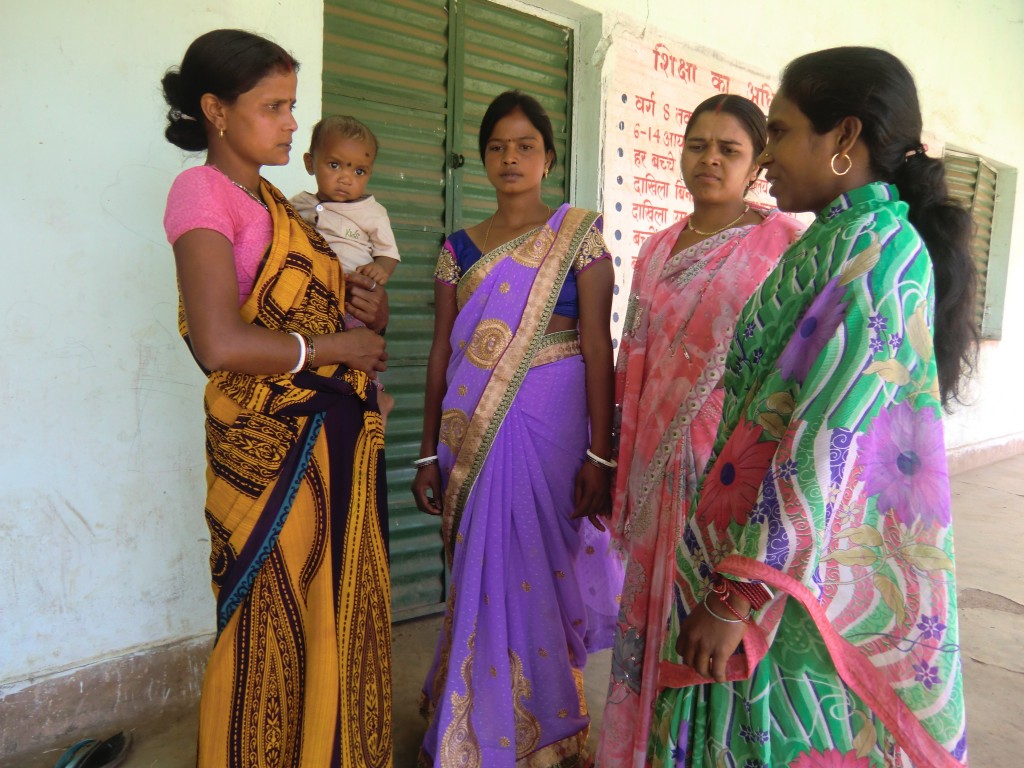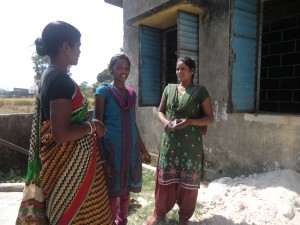India – Singing and Counseling Young Mothers on Health (I)

Chetanbari’s barefoot auditor, Poonam Devi, 25, is always accessible for help and advice to the women in the village. (Credit: Ajitha Menon\WFS)
A lilting tribal tune catches the attention of the gaggle of women gathered at the Integrated Child Development Services (ICDS) center in Jidu Pandra village that falls in Ormanjhi block of Jharkhand’s Ranchi district. Almost at once, all eyes follow the sound that is coming from the farthest corner of the room. As they keenly listen to the beautiful voice of Suman Devi, 25, singer and composer, gradually the Nagpuri lyrics explaining the ill-effects of child marriage start to sink in.
When the melody comes to an end, in the ensuing stillness, Suman opens a discussion on healthcare for women and adolescents. “Songs have greater appeal than lengthy speeches. They help me break the ice with the community. I write, compose and sing songs on health, sanitation and regressive social practices such as child marriage and dowry. I initiate every meeting with a musical number and once I know everyone’s listening I go on to talk on subjects like the need for immunization, taking iron pills, nutrition for pregnant women, and so on,” reveals Suman, the barefoot auditor for Jidu Pandra village.
There are 70 barefoot auditors, or Gram Arogya Sakhas, working in as many villages across 15 Gram Panchayats in two blocks of Ranchi and Hazaribagh districts, sensitizing rural communities on government health schemes and helping them avail and monitor the services available. “Each of the 70 villages in our intervention area has a barefoot auditor who is a part of the village and acts like a bridge between health service providers and the beneficiaries for the best implementation of government schemes,” says Faiz Ahmed, Project Coordinator, Child in Need Institute (CINI), Jharkhand.

(From left) Field Animator Shanti Devi, Gudiya, 15, of Bada Ulatu village and barefoot auditor Poonam Kumari, 20. Thanks to her presence of mind and fast action Poonam was able to save Gudiya from underage marriage. (Credit: Ajitha Menon\WFS)
The barefoot auditors have been selected and trained through intensive workshops conducted by CINI, a non-government organization working on mother and child health, under Oxfam India’s DFID-supported Global Poverty Action Fund initiative, ‘Improving Maternal Health Status in Six States of India’. Of the 70 committed, hand-picked volunteers, 60 are women. “The trainees were identified by the Village Health, Sanitation and Nutrition Committee (VHSNC) in each village on the basis of their networking skills, ability to communicate, awareness level and commitment to the cause of social development. About 25 of them were already working as ‘Sahiyas’ under the government’s National Rural Health Mission (NRHM) and had experience in community mobilization,” reveals Ahmed.
“I had to go to every home in the village and ask women to come for meetings to talk about health matters. Despite being from the community, I faced a lot of resistance. There was a general unwillingness to take time out. The progress was gradual, but once the benefits of information became apparent, more and more women started turning up on their own,” shares Poonam Devi, 25, the barefoot auditor of Chetanbari village, adding, “The VHSNC in my village picked me for the mission to generate health awareness because I was willing to give time, was accessible to all, and was interested in finding solutions.”
As a practice, the barefoot auditors take advice and guidance from field animators, also trained by CINI. For every seven villages, there is one field animator who plans awareness strategies and monitors the implementation of health services. To this end, s/he lends valuable assistance to the barefoot auditors to enable them to effectively sensitize the community.
“The barefoot auditors’ network has been doing exemplary work. Together we have ensured that health interventions that have the potential to save lives of women and children and prevent malnutrition among infants are being delivered competently,” explains Siben Devi, 32, field animator in Palu village, which falls under Chutupalu panchayat. “With our dedicated approach we have managed to earn the trust of the villagers. The work we have put in over the last three years since the project began has started to bear fruit now. The excellent results ensure that service providers take our inputs, suggestions and complaints very seriously as they realize that we have the backing of the entire community,” she adds. (© Women’s Feature Service)
Author: Ajitha Menon
Editor: Marjory Linardy
WTO RECOMMENDS
Talking about Safe Sex with Teens
Pooja Behara (name changed), 16, would probably have never realised that she was suffering from a sexually transmitted disease (STD) had Sabita Buta, a counsellor with a local non government organisation, not come into her cramped slum in Bhubaneswar, the state capital of Odisha, to talk to the adolescent children about HIV/AIDS and the importance of safe sex, sometime early last year. (From February 20, 2015)
Devadasi – Servants of God, used and discarded afterwards
It is an ancient religious practice that still traps young girls in India in a life of sexual exploitation. In India, devadasi means “servant of god.” Young girls are “married” to an idol, deity, or temple. These girls are often from the lowest castes in India—their parents have given them to temples as human offerings in order to appease the gods. (From June 12, 2015)
Need a license to rape? Just get married in India!
The topic sex continues to remain a taboo in India. Across all classes and religions, if there is one topic that many religious leaders in India can agree upon, it is the fact that sex is not supposed to be an act of pleasure. (From June 6, 2015)
http://blogs.dw.com/womentalkonline/?p=14511 http://bit.ly/1fmuWGC






